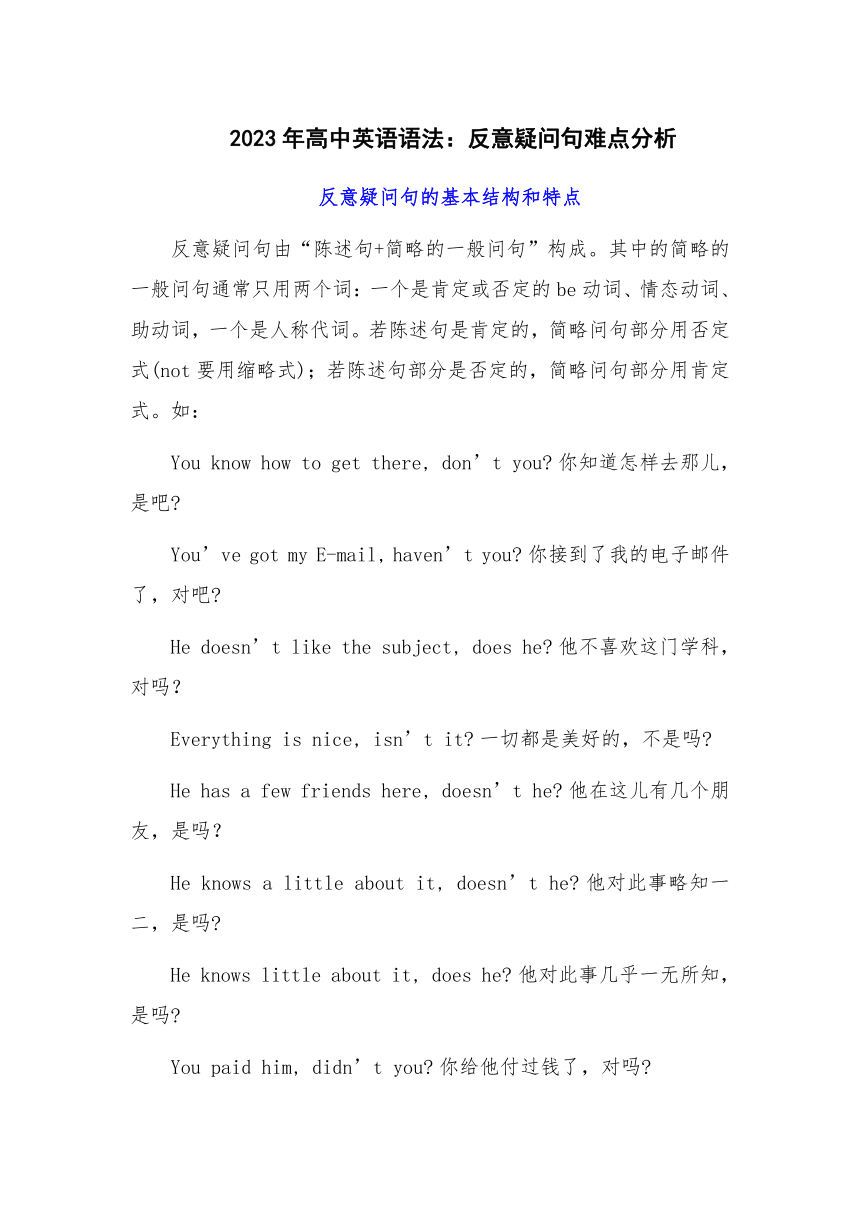
2023年高中英语语法:反意疑问句难点分析 反意疑问句的基本结构和特点 反意疑问句由“陈述句+简略的一般问句”构成。其中的简略的一般问句通常只用两个词:一个是肯定或否定的be动词、情态动词、助动词,一个是人称代词。若陈述句是肯定的,简略问句部分用否定式(not要用缩略式);若陈述句部分是否定的,简略问句部分用肯定式。如: You know how to get there, don’t you 你知道怎样去那儿,是吧 You’ve got my E-mail, haven’t you 你接到了我的电子邮件了,对吧 He doesn’t like the subject, does he 他不喜欢这门学科,对吗? Everything is nice, isn’t it 一切都是美好的,不是吗 He has a few friends here, doesn’t he 他在这儿有几个朋友,是吗? He knows a little about it, doesn’t he 他对此事略知一二,是吗 He knows little about it, does he 他对此事几乎一无所知,是吗 You paid him, didn’t you 你给他付过钱了,对吗 She would like to come, wouldn’t she 她想来,是吗 You’re coming, aren’t you 你会来的,不是吗 She told you, didn’t she 她告诉你了,不是吗 John doesn't like tea, does he 约翰不爱喝茶,对吗 You can’t swim, can you 你不会游泳,对吗 英语反意疑问句的三种基本结构 结构一:肯定的陈述句 + 否定的简短问句? It’s Monday today, isn’t it 今天星期一,是吗? He often goes to school by bike, doesn’t he 他常常骑自行车上学,对吗? They went to the park yesterday, didn’t they 他们昨天去的公园,是吗? 用法说明:前面陈述部分是肯定形式,后面简短问句用否定形式。简短问句的主谓部分通常由陈述部分的主谓语来决定,即人称一致、时态一致。 对于反意疑问句的回答,总的一个原则是:不管问题的提法如何,只要事实上是肯定的,就用 yes 回答,事实上是否定的,就用 no回答。但当陈述部分是否定句时,回答译成汉语时不一样。这与汉语截然不同,应特别注意。如: —You don’t want to go out, do you 你不想出去,对吧? —Yes, I do. / No, I don’t. 不,我想出去。/ 对,我不想出去。 结构二:否定的陈述句 + 肯定定的简短问句? That isn’t your book, is it 那不是你的书,是吗? Jim doesn’t speak French, does he 吉姆不会说法语,对吗? 用法说明:当陈述部分有 hardly, seldom, few, little, no, never, nothing, nobody, nowhere 等否定词时,疑问部分要用肯定形式。如: He never said she would come, did he 他从来没说她会来,是吗? Nobody can answer the question, can they 没有人能回答这个问题,是吗? Few people know about it, do they 几乎没有人知道有关这件事情,是吗? You have never seen the film, have you 你从来没看过这部电影,是吗? Neither you nor I can work it out, can we 你我都不能算出它,对吗? 结构三:祈使句 + 简短问句? Stop talking, will you 停止讲话,好吗? Pass me the pen, will you / won’t you 把这支钢笔传给我,好吗? Don’t be late again, will you 不要再迟到了,行吗? Let us help you, will you 让我们帮助你,好吗? Let’s have a rest, shall we 咱们休息一会儿,行吗? 用法说明: 1. 祈使句的反意疑问句,若前面是否定结构,则附加问句只能用 will you。若前面是肯定结构,附加问句用 will you,也可用 won’t / would / can / can’t you 或 shall we 等,它形式上是反意疑问句,但并不表示正式的疑问句,也不表示反意,而是表示邀请或表示请求。如: Close all the windows, will you / won’t you 把所有的窗户都关上,好吗? Don’t go to the park by bus, will yo ... ...
~~ 您好,已阅读到文档的结尾了 ~~